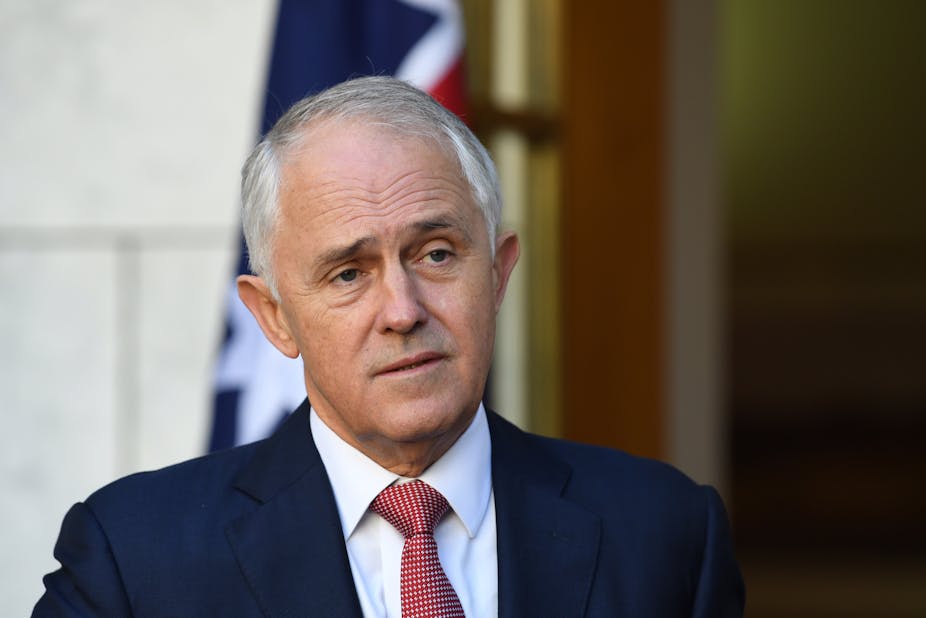Malcolm Turnbull’s spectacular elevation of “Australian values” raises questions about his own values. In particular, has he once again forfeited his political integrity?
This week’s targeting of foreign skilled workers and the new, tougher citizenship requirements smack of a desperate effort to tap into community concerns and insecurities, whether those fears are about job prospects, ethnic crime gangs, or terrorism.
A few years ago Turnbull, as a cabinet minister, would likely have challenged aspects of such measures if they were brought forward. Now, with Peter Dutton pushing him along, Turnbull is unashamedly exploiting anti-foreign and anti-Muslim sentiments as part of a wider strategy to try to combat bad polls, stop leakage to Pauline Hanson, wedge Bill Shorten, and gain some positive traction.
In 2013, when then prime minister Julia Gillard had the 457 visa for skilled foreign workers in her sights, Turnbull tweeted that her “attack on 457s strikes at heart of skilled migration system. & hypocritical”, and: “If you support skilled migration and a diverse society you don’t amp up chauvinistic rhetoric!”
When his tweeting was raised with him this week, Turnbull replied dismissively: “I’m glad that you’re analysing tweets from four years ago, but I’m focused on governing Australia today, and I’m putting Australian jobs first.”
Both sides of politics have been shameless in using 457s as a political football, and Labor deserves as much condemnation as the Coalition. Having said that, politicians can’t be allowed without challenge to throw aside their past stands. Changed circumstances can justify a new position but in this case what’s at play is mainly political calculation.
Of course any rorting of the foreign workers’ system should be rooted out; equally, the employment of Australians should be encouraged. But the replacement of the 457 visa with new arrangements was primarily about sending a political message.
This may resonate with a section of the electorate, though that could come with downsides for the government from particular businesses and ethnic communities (especially the Indians) that find themselves disadvantaged.
The “values” message from the citizenship changes is much bolder and cruder.
It is also potentially alarming, because it exploits people’s suspicions of “outsiders” and could provoke division rather than inclusion in our multicultural society.
Among the planned changes, there will be a longer period of permanent residency required before citizenship can be sought, more stringent English-language standards, and the need to demonstrate tangible measures have been taken to integrate into the general community.
The extended time is reasonable enough. At first blush, the argument for a higher English standard seems attractive, but a nuanced approach would recognise that some immigrants might have trouble acquiring better English but be fine citizens.
Much more provocatively, the government proposes putting into the citizenship test “more meaningful questions that assess an applicant’s understanding of – and commitment to – our shared values and responsibilities”.
Sounds OK, put like that? But the government revealed its true intent when it provided to the media four “sample” questions. To be fair, it did say they were not necessarily the ones that would be in the test – there will be some weeks of public consultation.
The “samples” were:
1) Does Australia’s principle of freedom of religion mean that in some situations it is permissible to force children to marry?
2) In Australia’s multicultural society, under which circumstances is it permissible to cut female genitals?
3) While it is illegal to use violence in public under what circumstances can you strike your spouse in the privacy of your home?
4) Under what circumstances is it appropriate to prohibit girls from education?
If anyone thinks these questions are not directed to pick up on anti-Muslim feeling, consider this. What would Finance Minister Mathias Cormann have thought if confronted with such questions when he became an Australian citizen? It’s a fair bet he’d have been amazed. But then they are not about former Belgians like Cormann. They are about Muslims.
The questions themselves are bizarre. If you were Machiavellian you might wonder if they’d been framed with the express purpose of demonstrating their absurdity.
Present laws – which new citizens are currently required to promise to uphold – prohibit forcing children to marry and female genital mutilation. Domestic violence is a crime.
If these questions are seeking to seriously test “values” – as distinct from use “values” as a political tool – they are naïve, loaded and designed to confuse. No responsible pollster would allow them to be asked in an opinion poll.
Beyond that, wouldn’t someone with bad values just game the system? Dutton agrees they would, but doesn’t put much weight on the problem.
No doubt a questionnaire could be drafted to deep dive into a prospective citizen’s values. But it would have to be much more extensive and sophisticated than would be practical for the test.
And let us keep perspective. While the citizenship system hasn’t been and can’t be watertight, the question posed in an earlier debate a decade ago by then Liberal MP Petro Georgiou is worth asking again: “Is there any evidence from the hundreds of MPs of all political persuasions who attend citizenship ceremonies that they doubt the sincerity of the people who take the pledge?”
The new push on citizenship presents some challenges to Bill Shorten, but Labor has had a low-key response, not making an issue of it.
For Turnbull, what looks to be a cynical exercise could go one of two ways.
People could see it as muscled-up Malcolm decisively positioning himself to respond to those in the community’s “mainstream” who feel neglected in an age of identity politics. “What this is about – the vast majority of Australians are pleased to see we are standing up for Australian values,” Turnbull declared on Thursday night.
Or people could view it as further evidence of Turnbull being willing opportunistically to belie his true self.
The focus groups will have some answers over the next weeks and months.

